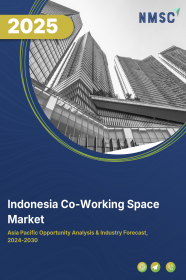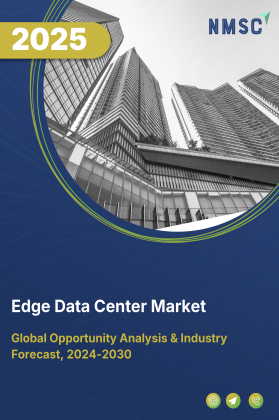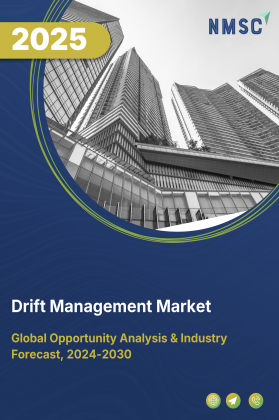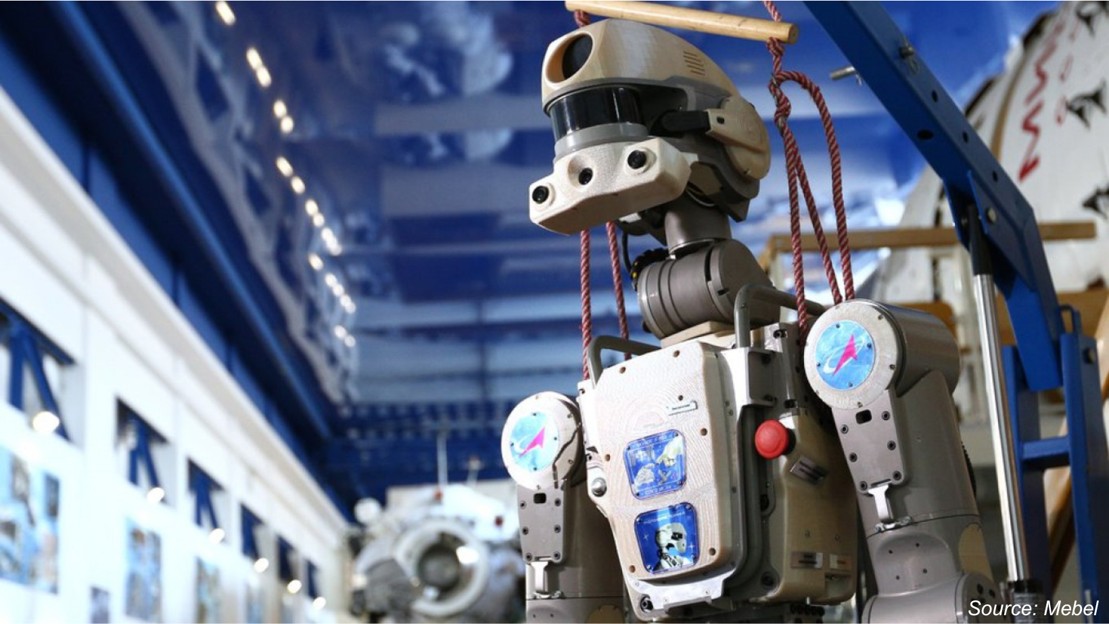
Indonesia Co-Working Space Market by Space Type (Shared Open Spaces, Enclosed Private Suites, Virtual Office Solutions, Event/Meeting Facilities), by Membership Type (Hot Desks, Dedicated Desks, and Others), by Business Type (Standard Coworking, and Others), by Business Model (Direct Ownership/Operation, and Others), by End User (Freelancers/Remote Workers, and Others), by Industry Vertical (Technology & IT Services, and Others) - Opportunity Analysis and Industry Forecast, 2024–2030
Industry: ICT & Media | Publish Date: 04-Nov-2025 | No of Pages: 158 | No. of Tables: 120 | No. of Figures: 65 | Format: PDF | Report Code : IC2042
Market Overview
The Indonesia Co-Working Space Market size was valued at USD 578.2 million in 2023, and is predicted to reach USD 2076.5 million by 2030, at a CAGR of 19.9% from 2024 to 2030. Co-working space represents a dynamic and adaptable solution to the evolving needs of businesses. These shared work environments offer flexibility in lease terms and space requirements, appealing particularly to startups and small enterprises seeking to avoid the upfront costs associated with traditional offices. The communal atmosphere encourages networking and collaboration among professionals from diverse fields, fostering innovation and creativity.
Equipped with modern amenities and strategically located, co-working spaces provide cost-effective, scalable, and accessible alternatives for companies seeking a central presence without the constraints of long-term leases. The industry has experienced significant growth as businesses recognize the benefits of this model, embracing the collaborative opportunities and resource-sharing inherent in co-working spaces.
Enterprise Adoption Of Flexible, Tech-enabled Workspaces Drives Scale
Corporate Indonesia is embracing flexible office solutions with increasing enthusiasm. Large businesses are turning to coworking providers to deploy branded, private office pods equipped with enterprise-grade infrastructure—like secure digital entry systems, managed Wi-Fi, and on-site IT support—that can be scaled up or down according to project needs. This model allows companies to sidestep traditional lease inflexibility, optimize capital deployment, and maintain consistent brand presence, while tapping into coworking ecosystems that blend flexibility with professional reliability.
Hybrid Work Culture Accelerates Demand For Local, Well-equipped Hubs
The hybrid work model has firmly taken root across Indonesia's urban and secondary cities, leading to increased employee preference for closer-to-home coworking venues. Workers seek outspaces that offer a productive balance: private desks for focused tasks, meeting areas for team sessions, and community zones for casual collaboration. Employers appreciate this shift as it cuts down on centralized office costs and increases geographic talent reach. Consequently, coworking providers are adapting by opening micro-hubs in suburban and tier-2 locations, outfitting them with video-ready meeting rooms, ergonomic setups, and flexible access to meet the evolving needs of hybrid teams.
Regulatory Gaps And Infrastructural Limitations Impede Expansion Beyond Major Cities
Despite rising demand for coworking spaces in Indonesia’s secondary and emerging cities, expansion efforts are hampered by fragmented local regulations and inadequate infrastructure. In many regions, zoning laws and licensing procedures remain unclear or outdated, creating uncertainty for operators seeking to establish new spaces. The lack of a standardized regulatory framework for mixed-use commercial environments further complicates approvals and delays rollouts.
Additionally, essential infrastructure—such as high-speed internet, stable electricity, and facility management services—is often underdeveloped outside metropolitan hubs. These constraints not only elevate operational costs but also reduce service reliability, limiting the appeal for enterprise clients and remote teams. As a result, while the broader market shows promise, inconsistent policy environments and infrastructure gaps continue to restrict the coworking sector’s ability to scale across Indonesia’s full urban landscape.
Emerging Digital and Academic Hubs Offer Untapped Coworking Potential
The expansion of Indonesia’s digital economy into secondary cities and university clusters is creating fertile ground for coworking space providers. Regions like Yogyakarta, Malang, Semarang, and Makassar—once seen primarily as academic or administrative centers—are rapidly transforming into dynamic innovation hubs driven by a mix of student-led startups, creative industries, and remote workforces. These cities benefit from proximity to young, tech-savvy talent pools, lower operational costs, and growing municipal investment in connectivity and infrastructure.
National programs focused on digital transformation, such as the "100 Smart Cities" initiative and university-led entrepreneurship accelerators, are amplifying the ecosystem readiness of these areas. Coworking spaces that align with academic institutions and local innovation agendas—offering hybrid memberships, mentorship programs, and event collaboration—can position themselves as key enablers of regional innovation. The ability to cater to diverse users, from research spin-offs to remote professionals, makes these cities ideal testbeds for flexible workspace formats tailored to local needs.
This regional growth trajectory not only helps decongest over-saturated urban centers like Jakarta and Bali but also supports Indonesia’s broader agenda of inclusive economic development. By investing early in education-linked cities and emerging digital corridors, coworking operators can gain strategic advantage, secure long-term user loyalty, and contribute meaningfully to the decentralization of Indonesia’s knowledge and innovation economy
Competitive Landscape
The Indonesia co-working space industry comprises various companies, including Regus (IWG), GoWork, WeWork, Koléga Coworking Space, Wellspaces Kemang, TierSpace, Concrete Space Coworking, SETTER, Impact Hub Jakarta, Neighborwork Coworking, UnionSPACE, B Work, WU Hub Coworking Space, Start Space, Werkspace Soho Capital, and others.
Indonesia Co-Working Space Market Key Segments
By Space Type
-
Shared Open Spaces
-
Enclosed Private Suites
-
Virtual Office Solutions
-
Event/Meeting Facilities
By Membership Type
-
Hot Desks
-
Dedicated Desks
-
Private Office Leases
-
Hybrid Flex Passes
By Business Type
-
Standard Coworking
-
Premium Managed Offices
-
Niche/Specialized Spaces
By Business Model
-
Direct Ownership/Operation
-
Franchise/Partnership
-
Real Estate Collabs
By End User
-
Freelancers/Remote Workers
-
Startups (<10 Employees)
-
SMEs (10–250 Employees)
-
Large Enterprises (>250)
By Industry Vertical
-
Technology & IT Services
-
Financial & Professional
-
Healthcare & Life Sciences
-
Manufacturing & Logistics
-
Public Sector & Education
-
Others
Key Players
-
Regus (IWG)
-
GoWork
-
WeWork
-
Koléga Coworking Space
-
Wellspaces Kemang
-
TierSpace
-
Concrete Space Coworking
-
SETTER
-
Impact Hub Jakarta
-
Neighborwork Coworking
-
UnionSPACE
-
B Work
-
WU Hub Coworking Space
-
Start Space
-
Werkspace Soho Capital
Report Scope And Segmentation
|
Parameters |
Details |
|
Market Size in 2023 |
USD 578.2 Million |
|
Revenue Forecast in 2030 |
USD 2076.5 Million |
|
Growth Rate |
CAGR of 19.9% from 2024 to 2030 |
|
Analysis Period |
2023–2030 |
|
Base Year Considered |
2023 |
|
Forecast Period |
2024–2030 |
|
Market Size Estimation |
Million (USD) |
|
Growth Factors |
|
|
Companies Profiled |
15 |
|
Market Share |
Available for 10 companies |
|
Customization Scope |
Free customization (equivalent up to 80 working hours of analysts) after purchase. Addition or alteration to country, regional, and segment scope. |
|
Pricing and Purchase Options |
Avail customized purchase options to meet your exact research needs. |

















 Speak to Our Analyst
Speak to Our Analyst

























